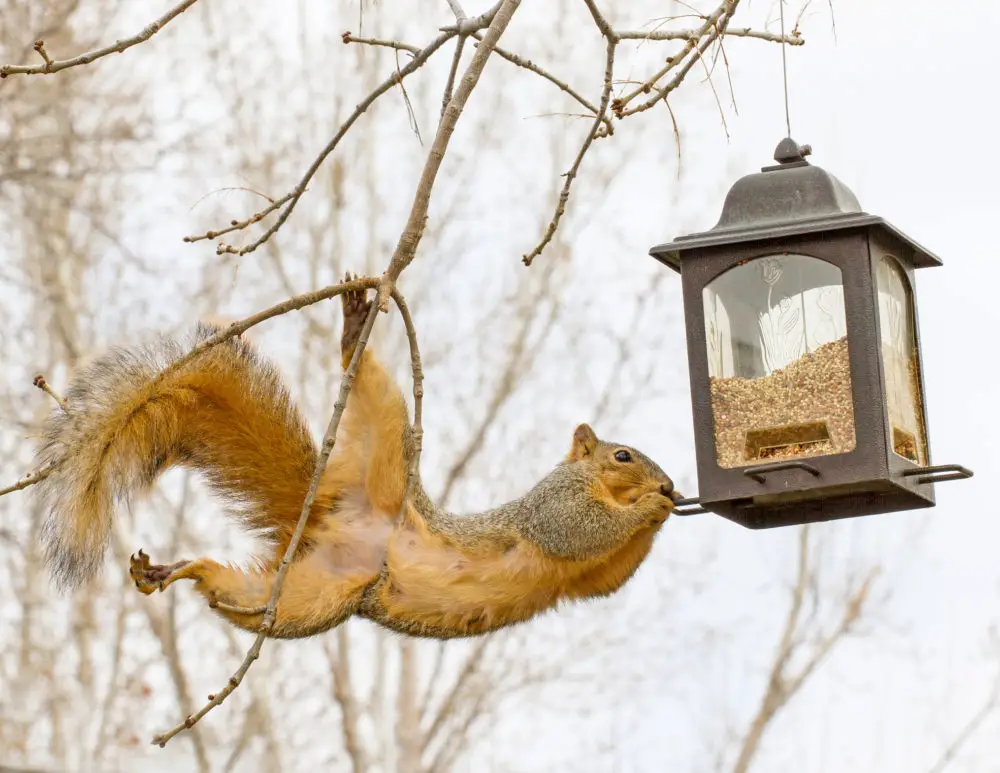If you like to keep bird feeders, you may have run into some problems with squirrels. Squirrels are clever little acrobats that will perform all sorts of gymnastic feats to get to a bird feeder, stealing your birdseed and driving you nutty.
We’ve compiled a list of methods effective for keeping bird feeders away from squirrels that can be used on their own or combined to meet the needs of your particular situation. So, if you’ve had enough of squirrels stealing food from your bird, here are 20 tips for keeping them off your feeders:
Tips for Hanging Feeders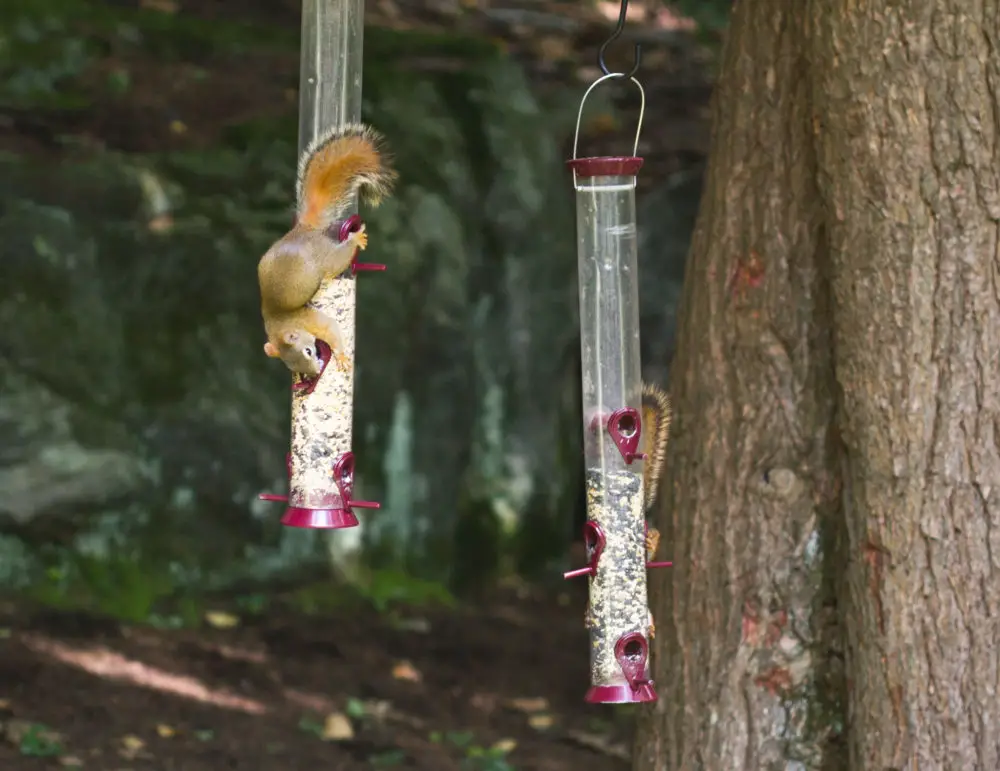
1. Adjust the height and distance of your bird feeder
Squirrels are very good jumpers. They can jump 5 to 6 feet vertically, and up to 9 feet horizontally. If they’re still getting into your hanging feeders, they’re likely not placed far enough out of reach.
Try hanging your bird feeder in between two trees, using wires to suspend the feeder at least 8 to 10 feet away from either tree. You’ll also need to make sure it’s away from branches squirrels might use as launching pads.
2. Add spinners/deterrents to prevent squirrels from crossing your wires
If you’ve already tried suspension but the squirrels are just walking across your wires, try adding spinners. Thread your wire through empty thread spools, short PVC pipes, or empty plastic bottles that will move and spin when squirrels try to walk across them.
In addition to spinning, this method doesn’t offer traction and squirrels won’t be able to grab onto them. Just make sure to keep your feeder away from branches and other surfaces squirrels can leap off of to reach your feeder.
Tips for Bird Feeder Poles
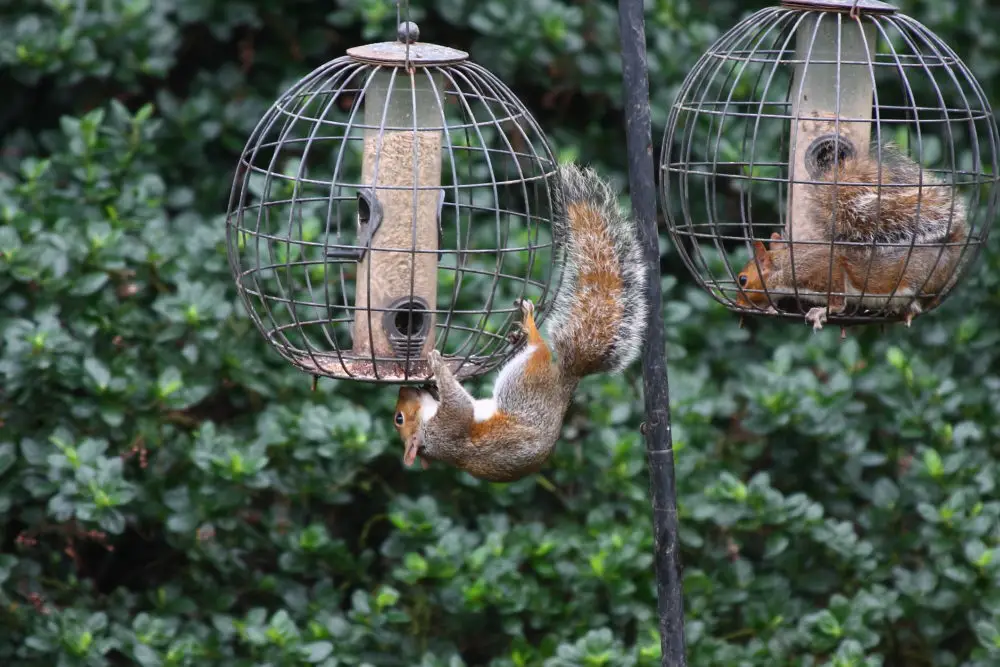
3. Add a hanging squirrel baffle
Bird feeder poles are a great option if you don’t want to hang them from trees. However, this also means you’ll have to deal with squirrels coming from two directions: From above and below. By adding a hanging squirrel baffle, you can deal with squirrels from above.
A hanging squirrel baffle is an inverted bowl directly attached to the top of your bird feeder. This prevents squirrels from jumping onto your bird feeder. Instead, they will hit the hanging baffle and be unable to reach the feeder below, falling off instead.
When choosing a hanging squirrel baffle, make sure that the diameter is wide enough to protect your bird feeder. Also, choose a durable material such as metal, so squirrels won’t be able to chew through. Metal is also great because it offers no traction for squirrels.
4. Add a bottom squirrel baffle
Adding a bottom squirrel baffle to your bird feeder will allow you to deal with squirrels coming from the ground. This second type of squirrel baffle wraps around the bottom of your bird feeder pole.
It’s a long tube made of either plastic or metal — both of which make it hard for squirrel to climb up your feeder pole. Instead, they slide back down.
If you choose this type of squirrel baffle, just make sure that the wraparound pole is placed high enough — about 6 feet tall. If squirrels can jump higher than the baffle, then they will still be able to reach your bird feeder. Also, make sure that it’s far away from any surface that squirrels can use as a launching pad.
5. Add a metal/plastic pipe
You can also make a DIY bottom baffle. If you have a thin bird feeder pole, you can install a 3-inch PVC pipe around it. For thicker poles, you can use a stove pipe, which is usually made of stainless steel or galvanized steel.
If you don’t want to pull your pole out of the ground, you can wrap galvanized sheet metal used for ductwork around it instead. Use metal screws and clamps to secure it.
Both of these options ensure that squirrels won’t be able to climb up the bird feeder pole. If you’re using a thicker pipe, just make sure to use a metal end cap. This is so that the squirrels can’t climb inside the pipe and make their way up the bird feeder pole.
6. Add lubricants
You can spread petroleum jelly and other lubricants around the bottom of the pole, making the surface too slippery to climb. You can also add lubricants to a hanging baffle to prevent squirrels from climbing down to your bird feeder. However, petroleum jelly hardens in cold temperatures, so this method only works during the warmer seasons.
You should exercise caution with this method. Some lubricants can be harmful to squirrels, birds, and other animals. Avoid using grease and glue, which can be ingested accidentally if it gets into fur or feathers.
Glue is also strong enough to damage fur and feathers, which can impact the animal’s ability to fly or keep warm. You don’t want to harm animals, just deter them from stealing seed meant for birds.
7. Add a slinky
A slinky is a fun, inventive way to prevent squirrels from climbing up your bird feeder pole. Install the slinky high enough that the squirrels can’t jump over it. It should also be compressed enough that it doesn’t drag completely. The slinky will prevent the squirrel from climbing.
However, it should be noted that a slinky might not be effective in the long run. Over time, it will stretch and lose it’s springiness, allowing squirrels to actually use it for better purchase. A slinky can also pose a hazard to squirrels and other small animals that get trapped inside.
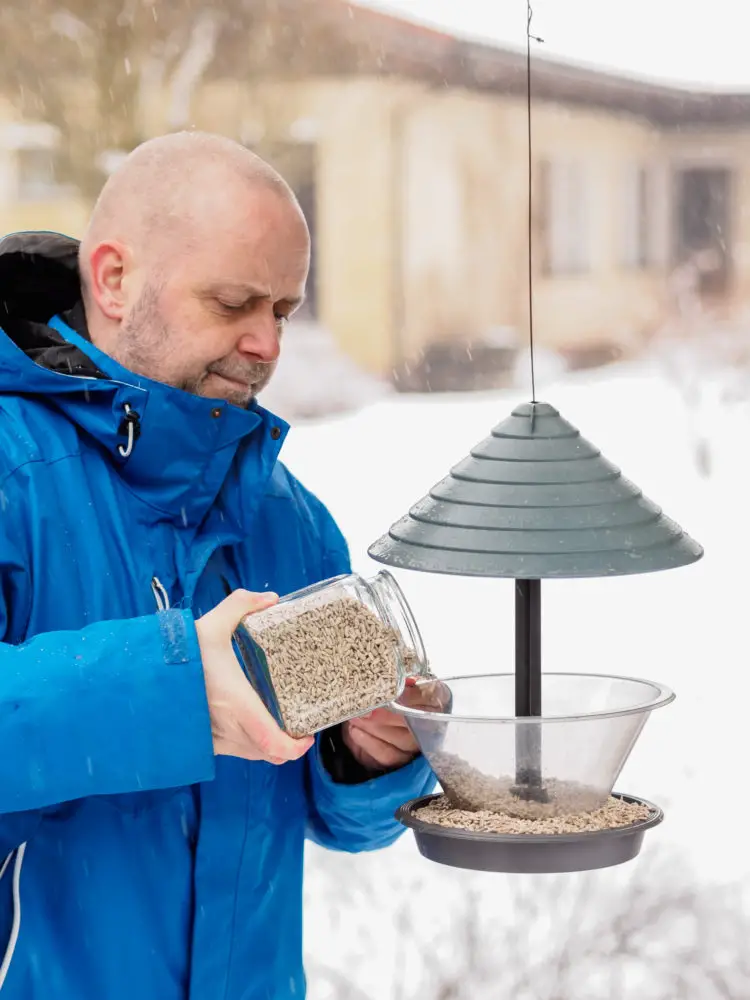
8. Use birdseed that squirrels don’t like
Squirrels aren’t interested in every type of birdseed and will leave your feeder alone if it contains a mix they don’t like. Try using seed mixes with safflower seeds, niger thistle seeds, and white proso millet seeds. Don’t worry, young birds love these seeds.
Take note, though, that the efficacy of this method will depend on the food availability in your area. If squirrels are unable to find other sources of food, they might resort to eating these types of bird seed anyway.
9. Mix hot peppers into your seeds
You can keep squirrels off your bird feeder by mixing hot peppers with the bird seeds. Squirrels are sensitive to capsaicin, the ingredient that lends heat to peppers. Consuming hot peppers will irritate the squirrels’ mouths and will prevent them from coming back to your bird feeder. Birds will not be affected in the same way.
You can choose from the many commercially available hot pepper bird seed mixes. You can also create your own by mixing chili flakes, chili powder, or chili oil into your bird mixture. A DIY mixture also means you can adjust the heat level of your birdseed.
If you’re concerned that your neighborhood squirrels are in pain, decrease the concentration of chili in your mix. Over time, you can increase the intensity of your hot pepper bird mixture if you need to.
Squirrel-proofing Your Garden
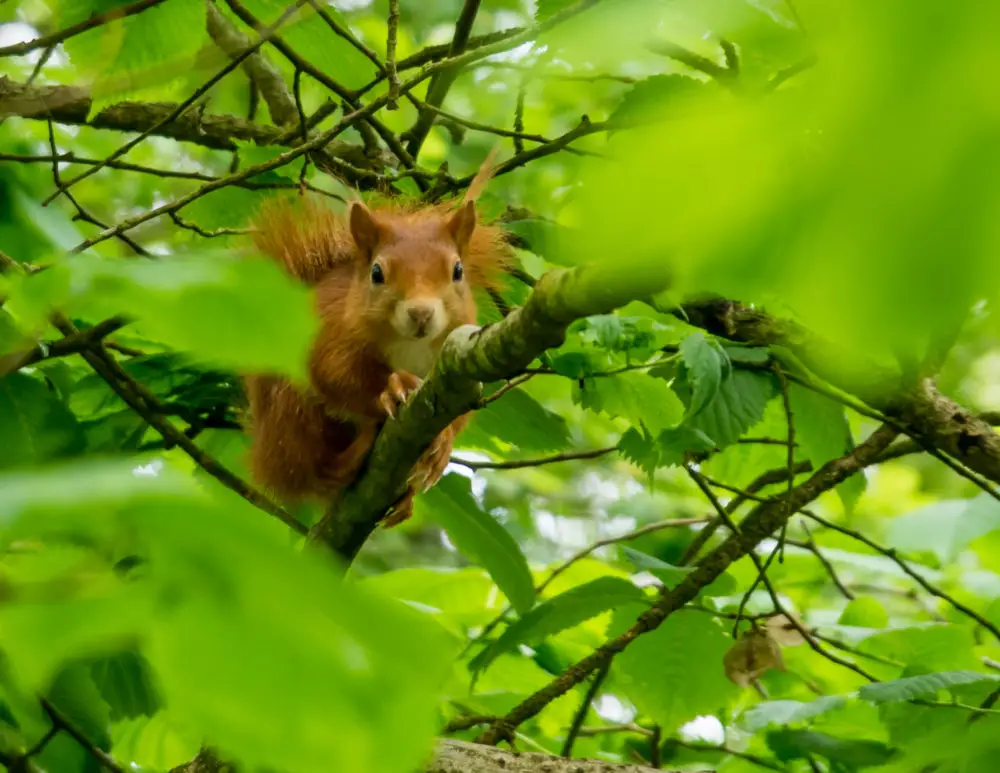
10. Maintain your garden
If you want to keep squirrels away from your bird feeder, it’s important to maintain your garden. Having an overgrown garden will make your property more attractive to these arboreal rodents.
Trim your tree branches regularly and make sure that they are 8 to 10 feet away from your bird feeder or any other surface. You might also want to remove any debris or structures that provide them access to higher surfaces such as your roof.
Keep the area immediately surrounding your feeder clean. Remove fallen seed mix, to discourage them foraging nearby. Cleaning away spilled seeds also prevents the birds from eating contaminated food.
Keep your grass trimmed. It’ll be easier to see areas where squirrels have buried their nuts. You can then remove their stashes, forcing them to move on.
11. Add fake predators to your garden
You can repurpose old toys by turning them into garden decor. For example, you can place a fake owl on a tree branch or a fake snake near your bird feeder. They will appear as predators to squirrels and can help keep them away.
Just make sure to change the location of these fake predators so that the squirrels won’t learn to ignore them. Also, take note that adding these fake predators might also scare away the birds. Nevertheless, this method might be worth trying if you really want to keep the squirrels off your bird feeder.
12. Have a motion-activated sprinkler
Motion-activated sprinklers can be an effective tool for squirrels that still try to get to your feeders. These sprinklers have an infrared sensor that releases a spray of water when it detects motion.
This option can be a little more expensive, but for persistent squirrels problems, they can help even when you aren’t there.
13. Use squirrel repellents
You can also use squirrel repellents to keep them away from your bird feeder or garden. You can make a DIY spray using peppermint or other strong-scented essential oils. You can also use chili flakes in your spray. Spray this around the bottom of your feeder pole and other areas squirrels are using to reach your feeder.
There are also products containing predator urine or blood that will effectively deter squirrels. You can buy these at your hardware or feed store.
Tips for Purchasing New Feeders
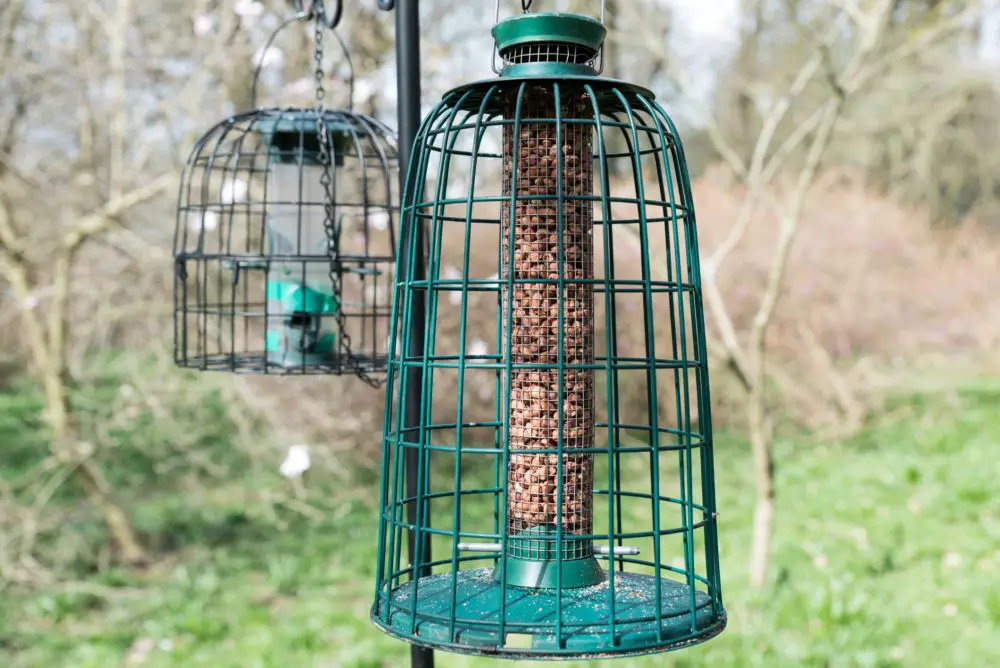
If squirrels are still getting into your feeder, it may be time for a new one. While some of the latest bird feeders come with a higher price tag, they also feature better and more complex designs that prevent squirrels from running away with all your birdseed. Here are some features to look for:
14. Choose a bird feeder with a weighted perch
A weighted perch is a fantastic mechanism that helps keep squirrels away from your bird feeder. These feeders have feeder ports attached to a mechanism that closes them when weight is placed on the trigger.
This feature works because the bird feeder will remain accessible to the birds. But squirrels are kept out even if they do manage to get to your feeder.
15. Choose a bird feeder with an outer metal cage
If you’re feeding smaller birds, you might want to choose a bird feeder with an outer metal cage. The cage’s openings should be large enough for the birds, but small enough that squirrels can’t get through.
16. Choose a bird feeder with a seesaw design
A bird feeder with a seesaw design is similar to the one with a weighted perch. With this type of bird feeder, you have counterbalanced baffles that use the squirrels’ weight against them. Whenever a squirrel lands on one side, the bird feeder will tilt in the same direction, which will then close the feeder port.
17. Choose an electric or motorized bird feeder
An electric or motorized bird feeder also features a weighted perch. This time though, when a squirrel lands on the perch, it spins. The motion prevents the squirrel from accessing the birdseed.
And when the squirrel gets dizzy, it falls off the feeder. But don’t worry — they don’t cause lasting damage to the squirrel. Just remember to replace the batteries regularly.
If all Else Fails
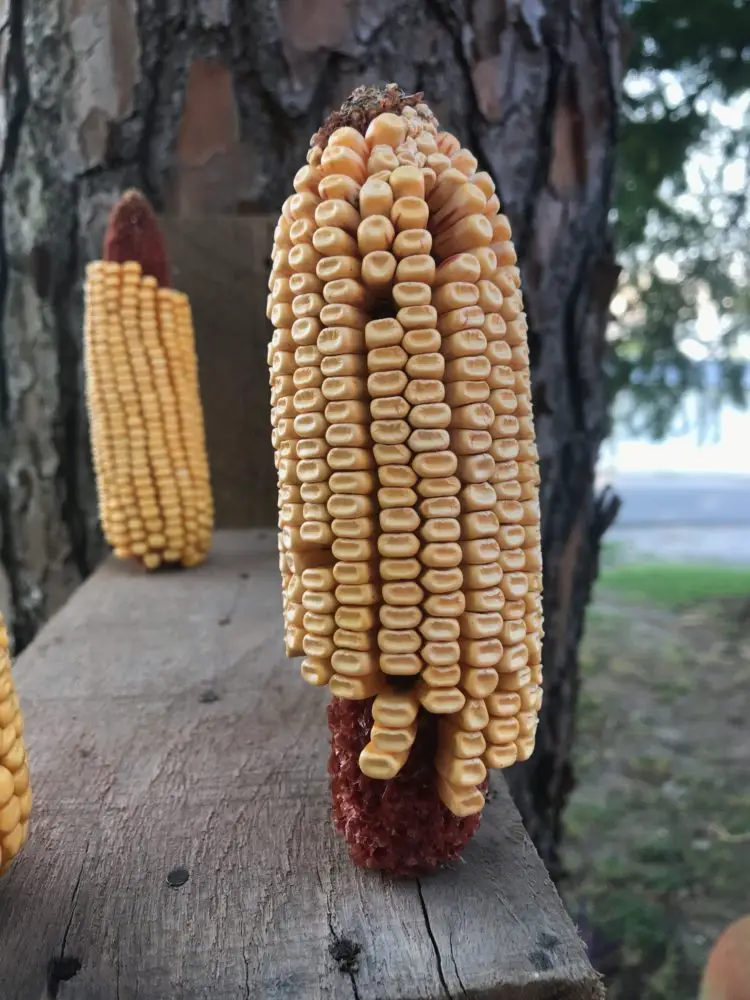
18. Remove your bird feeder temporarily
If you just can’t shake off the squirrels, you might want to consider removing the bird feeder, temporarily. Once the squirrels realize the food source is gone, they may move on, and you can put your feeder out again.
This method is not permanent, and there’s a chance that the squirrels might return when your feeder returns. So you might want to just use this method during times when squirrels are more abundant than usual.
19. Set up a separate feeding area for squirrels
If you want to save your expensive bird seed for the birds, you can set up a separate feeding area for the squirrels. Just make sure that this new feeding station is on the ground and far enough from your bird feeder.
You can hang corn cob feeders from a tree branch or nail them onto a wooden surface. Corn is appealing to squirrels but won’t cost you as much as birdseed. You can also feed the squirrels some nuts and berries or whatever leftovers you might have at home.
20. Consider calling a professional to deal with your squirrel problem
If your squirrel problem becomes too much to handle, consider calling in a professional. Depending on your state, actions such as trapping and relocating squirrels, or hunting and killing them may be regulated. So consult a professional before you take any more permanent action.
